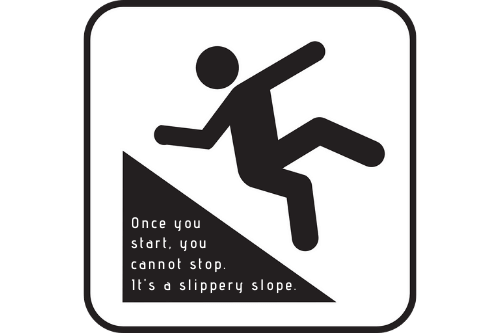
YouTube / iTunes / Spotify / Radio Public / Pocket Casts / Google Podcasts / Breaker / Overcast
Listen to ArtisanEnglish.jp posts & lesson intros here.
WotD: Slippery slope
Have you ever played the board game Snakes and Ladders?
If you have, then you can understand the meaning of slippery slope well enough.
You roll the dice, and if you land on the bottom of a ladder, you can climb up and get ahead.
Landing on the head of a snake, however, has consequences.
No one ever intends to land on a snake; it just happens.
At times, our actions have unintended consequences.
It’s what it means to be on a slippery slope.
We cannot prevent things from occurring.
Life is like that, too.
Every time we take action, we try to predict what will happen beforehand.
Often, we’re correct.
Sometimes, we end up on a slippery slope, and there are unintended consequences.
I’m sure no one intends to become a drug addict, yet it happens every day.
It’s happening in Japan as you read this.
Someone somewhere is making a decision right now to get involved with illegal drugs.
Unintentionally, they are putting themselves on a slippery slope, which leads to drug addiction, incarceration or even worse – death.
Sometimes, though, due to our fear of slippery slopes, we fail to take action to avoid such unforeseen consequences.
Or at least that’s what our conscious tells us.
Many people are afraid of taking chances because they believe they may fall onto a slippery slope that will be their downfall.
Sometimes, though, the slippery slope leads to good things — one time, I had plans to go to Germany and eventually go into business.
One day, I gave a cute Japanese girl some Greek baklava.
‘Because you are so sweet,’ I said.
Now, here I am in Japan with a wife, a house, a couple of cars and a dog.
Sometimes, the unintended consequences of a slippery slope are not so bad.
Flesch-Kincaid Readability Test
This post is understandable by someone with at least a 7th-grade education (age 12).
On the Flesch-Kincaid reading-ease test, this post scores 72.
The higher the score on a scale of 0 – 100, the easier the passage is to read.

